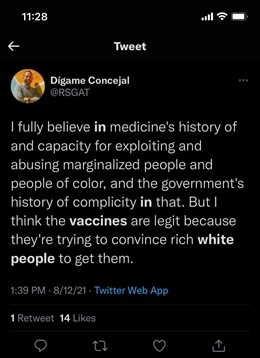By: Joy Emenyonu, Student Intern at Colorado Black Health Collaborative
Tyler Perry Cause and Effect
Earlier this year, renowned Black film producer, Tyler Perry, sat down for a discussion with some Atlanta doctors to discuss the COVID vaccine. In this video, Perry briefly mentioned that Black people were apprehensive about the vaccine because of the history of maltreatment by medical professionals. He cited the Tuskegee study and Henrietta Lacks, and acknowledged the validity of the distrust that Black people may feel in health related situations. Perry also mentioned that those experiences were part of Black history and that many people do not know about. The horror of the Tuskegee studies and the lack of ethical consideration for Lacks highlight ways medical systems have historically taken advantage of Black bodies. I think these experiences from Black history are really important and they shed some light on vaccination decisions today. Some Black people cite these examples of reasons why they don’t want to get the COVID vaccine.
The sum of the Tuskegee Study
The Tuskegee Study was conducted by the United States Public Health Service and the CDC from1932 to 1972. 600 Black men with and without syphilis were analyzed. The men were ‘financially compensated’. The purpose of the study was to observe the impacts of the syphilis. For many of these men, being monitored by the research doctors was the only form of healthcare they received. When treatment was discovered, it was withheld from the men, ensuring that they would succumb to complications from the illness. These complications ranged from mental health issues to death. According to CDC documents over 100 participants died from complications and 40 spouses contracted the disease with some of them passing it onto their spouses. In 1973, the Tuskegee Health Benefits Plan was put in place to fund the treatments for those men and in 1975 wives and children were included in the plan. But ultimately that study ran for 40 years, and the government abused the patients in the study. Although they did not inject the men with syphilis, they withheld information about the illness and treatment itself. The last participant of the study died in 2004. This is incredibly recent. Knowing that the government is capable of this behavior is concerning to say the least. This on its own provides space for distrust and contempt for the American health care system.
What about Henrietta Lacks?
Then, there was Henrietta Lacks. Lacks was a Black wife and mother who went to John Hopkins hospital when she discovered a lump in her vagina. It was here that she found that she had cervical cancer. Dr. George Gey was the doctor that diagnosed and treated her. But at that time he, like many other researchers, was primarily concerned about finding a way to grow human cells in culture. Dr. Gey was using his patients’ tissue to try and grow the cells without much success. When he attempted to culture Lacks’ cells, he found that they grew rapidly. This was a miracle discovery and Dr. Gey was able to use them in his research and most importantly sell the HeLa cells. Eventually, the discovery of the polio vaccine and others would be contributed in part to the discovery of Henrietta’s cells. The ethical dilemmas lie in that Henrietta never consented to have her cells used in this way. This was before the time of informed consent, and so the regulations at the time did not condemn Dr. Gey. In addition to that, her cells have generated millions of dollars for numerous research and pharmaceutical companies and yet her family is still poor and without any form of health insurance or access to health care. At one point scientist tried to culture the cells of her children and siblings. The need for scientific advancement in these instances trampled on the human rights of Henrietta and her family. This is yet another example of larger institutions taking advantage of and devaluing Black lives.
Fast Forward to the Present
But it gets worse. This trend of poor healthcare and negligent research is still prevalent today. Black women are 3 to 4 times more likely to have adverse complications of childbirth than white women. This holds constant across socioeconomic factors like education, income, etc. Ultimately, this meant that an uneducated poor white woman has better chances of successfully delivering a baby than a wealthy well-educated Black woman. This alone puts the maternal mortality rates far behind that of other developed countries.
COVID-19 and Black People

With these statistics, it is understandable that vaccine rates for Black people and people of color are below rates of others. However, in the past two weeks (as of August 4, 2021), the vaccination rates of Black people have gone up dramatically, with rates up 15%. The Delta Variant, and social pressures could be the reason for this uptick. But, the timing of this surge in comparison to the initial roll out of the vaccine is consistent with the racially motivated hesitation expressed on Twitter. Specifically, sentiments were shared by Black people about waiting for white people to get the vaccine first or only being comfortable getting the vaccine in white neighborhoods. To avoid being mistreated because of their race, Black people are essentially taking extra precautions to keep themselves safe.
But the fact is that there are still health disparities that directly impact Black people shows that the health of Black people is still not entirely being taken seriously. This is not to say that the CDC and other governmental organizations are not trustworthy today, but history demands caution in the least. When thinking about the reasoning for the debate of why or why not people are getting vaccinated, it is important to recognize that Black people historically have horrific experiences with the American Healthcare system. At the very least, the hesitation is justified.